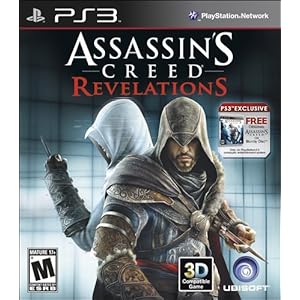
I honestly was less disappointed when I found out this game was going to star Ezio than I was when I learned the same about Assassin's Creed: Brotherhood. After all, with that game they had already established a willingness to reuse the same protagonist, and it makes a certain amount of sense to have a trilogy within a larger trilogy, that being the one about the series' meta-protagonist Desmond. I don't know that the game released next year will actually be called Assassin's Creed III, and I wouldn't be surprised if it features another new or returning central character, but I am reasonably confident that it will resolve Desmond's story without killing off potential for future games in the series. Revelations does a lot of work toward setting up that sort-of conclusion, both in the resolutions it gives to Ezio and Altair and the small steps forward it takes in the larger narrative. Also, that narrative has hinged on the end of the world happening in 2012, and of course it would be silly to have a game about that come out in 2013 or later.
Revelations was advertised as being a game to finish the stories of Ezio and Altair, and I'd say it does so, though in a slightly odd way. Despite them both appearing on the cover, you will spend the vast majority of the game playing as Ezio again, with only five missions as Altair, all relived through keys Ezio finds (and relived also by Desmond too obviously, in a weird Inception-style layering of realities), all taking place in the Assassin stronghold at Masyaf, and mostly being pretty limited from a gameplay perspective. But Altair actually gets a more purposeful send-off as a character, as we see snippets of his entire lifespan, struggling to keep the Assassins on the right path and make the proper preparations for his descendents to follow their own paths. There are some really strong moments in these missions, that finally made me care about a character who was mostly just a jerk in his own game. Conversely, we do see Ezio accept what the true purpose of his life is and get closure on some things, but there's less of a finality to his arc. Still, he also had some good moments.
Looking at the game itself though, while Brotherhood won me over with what it brought to the table in terms of new concepts and systems for the series, Revelations seemed a bit light on actual new gameplay content that was enjoyable. While the first game obviously established the vital climbing and combat mechanics, and the concept of the series, and the subsequent games added fun features like core combat improvements and an economy that allowed you to purchase better equipment and renovate businesses in exchange for more influence over the world and the ability to recruit and level up new Assassins who could help you on missions, there's not much new about Revelations that I really liked. I will say the hookblade is a very good addition - it doesn't have much effect on combat, but it does make getting around easier by letting you climb a bit faster and use suspended wires all over the city of Constantinople like ziplines.
Otherwise though, the additions were either a wash or actively irritating. Bomb crafting is interesting in theory, but there's really not much that they allow you to do that you couldn't do before in another way. It's not like you need more ways to kill enemies, smoke bombs already existed to allow for obscuring your movements, and there are other methods of distraction like poison or hiring citizens to help. Adding a control component to the assassin training missions provides a new source of revenue but is also a money sink on its own, and the new stuff with notoriety and defending your territory is almost a total disaster. Now instead of permanently taking over Templar strongholds, they can be retaken if you're a wanted man, and the only way to defend them without taking them back again is to engage in an undercooked and uninteresting tower defense-style minigame. Luckily you can avoid that altogether by keeping yourself off the radar, but now renovating businesses increases your visibility, and the methods to reduce it are decreased in number and less effective. It's just more of a chore to build up your power over the city than it was before, and I really don't see the benefit.
On top of the questionable additions to the available distractions from the game itself, the game itself seems a bit slighter than it was on the past. I'm not sure if my perspective is skewed or what, but it definitely felt like a shorter game to me, especially in the second half when the plot kicks into high gear and every memory sequence seems like it's over in an hour or two. There's not exactly a shortage of side content, and I know for a fact there's a number of optional missions I can finish as soon as I get back to the game. But the critical path through the story definitely felt a bit rushed to me, especially in the end, when the game teases what could be a big confrontation but it never comes. It's just like there was supposed to be one last twist and one last big Templar you'd have to track down and assassinate, and that final act doesn't really come. Really, you don't do much actual assassinating in general. Those silly scenes where you stab a guy in the neck and the environment turns into white nothingness and the victim gives a final confession or Ezio just blesses them are a staple of the series, and they're unfortunately in short supply in this game.
It did have some strong spots - the game has the best development of a human relationship in the series, and the underground tomb missions which focus on more specific platforming are better than they've been before, and make a nice effort to remove some of the sterility from the series' level design. I even liked the first person platforming levels you unlock by finding small objects in the city, which aren't terribly fun but are a nice break from the game's regular hustle and bustle and do a good job of establishing an interesting past history for Desmond, though they're light on any real surprises. And of course the multiplayer is back, and it's still fun as long as the other players aren't idiots. Of all the main games in the franchise, Revelations feels the most like a stopgap. It felt less connected to history, and had the smallest cast of characters, and the least momentum in the overarching story. But it did hit a few important beats, and it's still fun just to run around the city and mess up fools, and I'm still looking forward to what's next. It's a bit unfortunate that Ubisoft has felt the need to push out a game every year to keep the series relevant, but I'm not going to pretend I haven't enjoyed playing them every time.
Friday, December 9, 2011
Assassin's Creed: Revelations
Friday, April 8, 2011
Game Update 17: DLC Round-Up 4
Surprised it's been over a year since I've done this. But I guess that happens when you don't buy any new games for almost a year.
Assassin's Creed: Brotherhood: The Da Vinci Disappearance
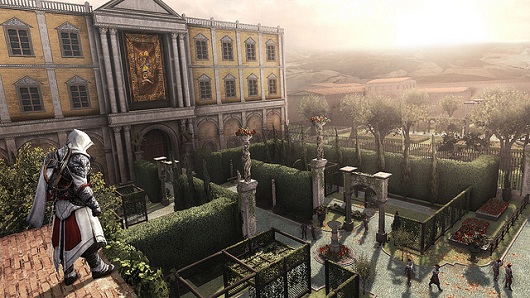
Review at Player Affinity
Costume Quest: Grubbins on Ice

This add-on to Costume Quest was roughly one third the length of the original game at one third of the price, which made it a nice way to extend the experience a little for fans. It takes place after the original and has a winter theme, though the gameplay is pretty much the same - you trick or treat until the area is clear, fight simple turn-based battles, find some collectible costumes and upgrades, and find stuff for people. The boss fight at the end was the most challenging encounter they've made so far, although it still wasn't terribly difficult. The ending teases more content on the way, though I suspect at this point it will be another stand-alone game rather than a small five dollar chunk.
Left 4 Dead 2: The Passing/The Sacrifice

Originally, the intention was to release The Passing for L4D2 and then The Sacrifice for L4D1, tying the two games together and killing off one of the original characters. The Sacrifice ended up also being released for L4D2 though, which allowed players of that game to play with the old characters using the equipment and enemy upgrades from the sequel, as well as starting the release of all the old content in the same way. So while the two campaigns are kind of short and don't add a whole terrible lot in terms of new twists on the series, they're still pretty fun and helped Valve experiment with new ways to roll stuff out to players. The online comic that preceded The Sacrifice's release was interesting as well.
Mass Effect 2: Arrival
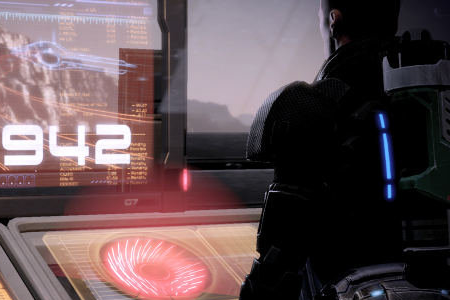
Review at Player Affinity
Red Dead Redemption: Undead Nightmare

Pretty darn meaty for ten bucks, Undead Nightmare completely changes Red Dead from a western-themed shooter to a game all about scraping by against a horde of zombies. Ammo is limited, enemies charge at you in groups and only go down easily from headshots, and there isn't a lot of help to be found. You'll usually divide your time between doing missions to advance the lengthy and surprisingly funny story and rescuing and defending outposts from invasions, which is more fun than it sounds. Most DLC doesn't come close to changing the game as much as this one, and it's a lot of fun. There are a bunch of other supernatural extras like side jobs involving horses of the apocalypse and sasquatches. One of the best DLC packs for the money I've ever played.
Sunday, January 23, 2011
Assassin's Creed: Brotherhood
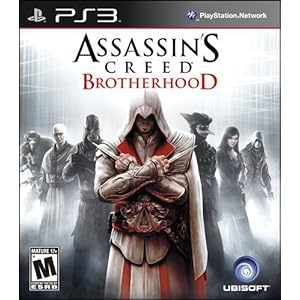
I was a bit surprised by the two year gap between the original Assassin's Creed and the second game when so many franchises these days focus on the yearly schedule, but it didn't take too long for Ubisoft to decide to annualize it. While II jumped the series forward in time a few hundred years (for the bulk of the gameplay, anyway) and used a new main character, Brotherhood is a direct continuation of that character's story, with the added hook of a significant team-building element in the single player and a multiplayer component as well. So in some ways it feels like a secondary game just meant to make some money and remind people that the franchise still exists before the "real" next one comes out, but there are enough developments to the overarching plot and additions to the standard gameplay that it's definitely deserves to stand beside the other games as a legitimate sequel.
So Brotherhood starts shortly after ACII ended, both in Ezio's time and in Desmond's. I thought the game might take place entirely in the past since Desmond already got what he needed from Ezio's memories, but it turns out there's still more he and the team need to figure out, so it's back into the Animus he goes. They hide from the bad guys and he learns more about the history of his ancestor. Due to predictable circumstances Ezio doesn't lose all his ability but most of his equipment is gone, forcing him to rebuild his arsenal as he relocates to Rome. We got a small taste of that famous city at the end of the last game, but Brotherhood lets you explore it fully, and it's the biggest single location in the series. The scale of the games seems to have curiously shrunk over time, with the first featuring three famous cities and the connecting areas, the second including two major locations and a few smaller ones, and Brotherhood having only the one significant location. But it's varied and big enough for the game's purposes, plus there's plenty of opportunities to revisit old locations for a bit.
The progression is similar to ACII for a while, as you discover the plans of the enemy (this time the whole Borgia family) and make some of your own to eliminate their influence over the city. Ezio's more ambitious this time though, aiming to completely remove the Templars from the city by buying out businesses and eliminating anyone of importance who stands against him, and most significantly, taking over the Assassin's brotherhood and building his own army of recruits. These systems add a lot to the feel of the game without being too distracting, as it's just a few minutes of navigating menus to maintain your affairs and the recruits come with the benefit of being able to help you out in battle as needed. All of these ideas are actually pretty simple in execution when you really look at them, but they're robust and interesting enough to make an action game like Brotherhood seem more important than one man's quest for revenge.
They do a surprising amount on Desmond's side too, letting you see a few familiar areas in a new light, bringing back ideas like snooping through emails, showing you how his assassin training is really progressing, and ending on a cliffhanger that left me both surprised and anxious to see what happens next. In addition to the required stuff, the optional content seems more considered this time. The secret puzzles left by subject 16 are back, but in addition to that you can do things like unearth some repressed, sad memories from Ezio's past and do some extra assassinations a bit more complicated than the ones in the last game. And of course there's the online, which doesn't seem to have the biggest PSN community but was pretty fun in the little of it I managed to play. You choose a character and try to track down another player while the same is being done to you, and the constant cat-and-mouse assassinating and balance between blending in and knowing when to use your flashier skills are cool enough that you don't really care who wins, just because it's interesting to screw around with.
There's not a whole lot new with the audio or video, with the voice cast and familiar soundtrack returning and not too many graphical enhancements. It's nice that you can get from one end of Rome to the other without loading, and they at least managed to fix most of the faces, making Kristen Bell's Lucy no longer resemble a human-fish hybrid. There's nothing too exciting about Ezio's story for the most part, and unfortunately the reason for most of the conflict in the whole game is pretty poor. Despite the crazy conspiracy plot, the team has been pretty faithful about honoring what the historical figures they play with were generally doing at various points and when they actually died, but the justifications for certain things seemed flimsy when a bit of tweaking would have made it all make sense. There's no reason Ezio wouldn't have killed some of these guys when he had the chance, so having him randomly decide not to rather than creating a situation where he couldn't just seems lazy. But otherwise I still enjoy what they do with the story, and the modern stuff in particular was pretty good. They do a good job of making all of the characters likable this time, and that aforementioned ending is memorable and actually a pretty significant bummer. I wasn't expecting the story to affect me the way it did, and I guess that's worth noting. There should be another game later this year, and whatever time period it takes place in, I'll probably be enjoying it.
Tuesday, March 30, 2010
Game Update 15: DLC Round-Up 3
We ain't gonna stop this DLC thing.
Assassin's Creed 2: Battle of Forli

Assassin's Creed 2 was a lot of fun, so I was excited when I heard they were extending its life with a couple of cheap add-ons. They were made up of content that had to be cut from the original release for time, but I was still interested in seeing those gaps get filled in. Unfortunately, both packs had a few issues that made me see why they might not have charged a ton for them. Battle of Forli adds a repeatable mission that lets you play with Da Vinci's flying machine if you want some more of that, and a little more of the story in Forli, a city that you passed through in the regular game but didn't spend much time in. I liked seeing some new details of what happened during that missing period, but ultimately the missions themselves weren't that fun. A couple were fine, but too many eschewed the normal stealthy, acrobatic gameplay for awkward, uninteresting battles between groups of soldiers. It's not that mixing it up is bad, but the game just isn't made to handle it well, and the chapter seemed pretty anticlimactic in general.
Assassin's Creed 2: Bonfire of the Vanities
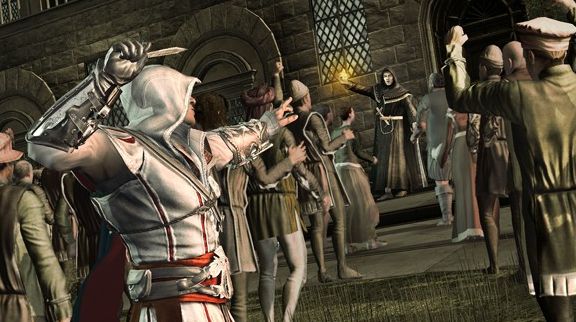
Vanities cost a bit more and I was hopeful about it, since it unlocks an entire section of Florence that was missing. And it started off fine, giving you a bunch of small assassinations to take care of. Unfortunately, some of them are designed to be arbitrarily difficult with no justification for the ridiculous conditions they set, creating an uneven, sometimes frustrating experience. Most of the problems come from a few missions deciding that you can't be spotted by any guards before intercepting your target, which would be fine if there was any reason for it and if you didn't have to run away from all of the now fully aware guards in the area once you pull it off. It would also help if it was just a bit clearer about what did and what didn't get you seen. There was a more expensive version that also unlocked a few tombs that were exclusive to a special edition of the game, and they were pretty fun, though maybe not worth the five bucks. I don't really regret playing these, although they really didn't add much to the game in the end.
Heavy Rain: The Taxidermist
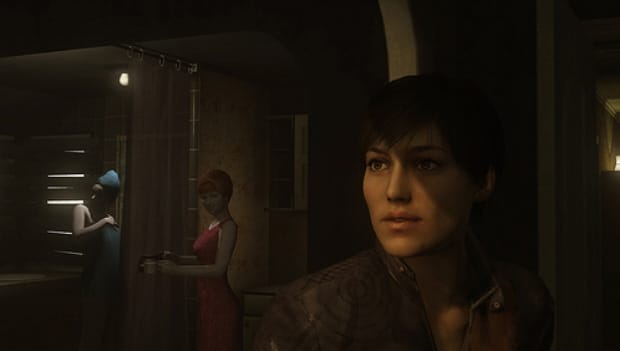
I don't think this is publicly available yet, but if you preordered the game like me you got a free download code for it. It's pretty much Heavy Rain in a nutshell. You're investigating a possible killer's house, and after a certain amount of time investigating the guy's extremely creepy house he shows up unexpectedly and you have to try to escape. There's a lot of different ways you can go about it, and at least five different ways it can end, some good and some bad. It's completely inessential to the main game's story, but if you had fun with it and want another little piece with the same strong presentation and tense gameplay, it's certainly worth checking out.
LittleBigPlanet: Pirates of the Caribbean Level Kit

I was lucky enough to play this for free thanks to a code from a friend. It's similar to the Metal Gear Solid pack, adding some new gameplay mechanics, pieces to make stuff with, and a set of five levels themed after something famous. I think they only cover the first two movies, which happen to be the ones I've seen, having you escape from some pirates, find a ship, and take on the Kraken. The water system certainly adds more to the game than the paint gun, and the levels are full of the stuff, letting you swim around and solve some new puzzles with some things that float and some things that don't. I'm not sure how I feel about all these premium level packs relying on other properties to sell themselves, but I can't say they aren't fun ways to extend the game's life and inspire players to create more interesting levels. Really, they could keep doing this instead of of releasing a sequel and I'd be fine with it.
Monday, January 11, 2010
Best Games of 2009
I don't see why so many major publications give out their awards before the year is even over. I mean, yeah, pretty much everything that belongs there is already released by that point, it just seems a bit hasty. Anyway, this is definitely one of my best years for gaming in a long time. It's not that there were definitely more awesome games to come out, it's that, at least in the last few months, I actually managed to play more of them then I usually ever do. You know it's a strong fall season when I can't even be bothered to finish a Tim Schafer game because there's too much else I'm interested in. All right, let's begin.
Best of 2009
9. Halo 3: ODST (360)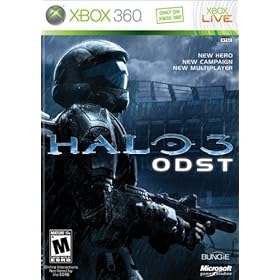
Most years that a Halo game comes out, seeing it this low would be weird, but it seems like I liked this one about as much as anyone. It's an interesting experiment that does some new things with the formula, but either people were turned off by the expansion pack nature or are just getting tired of the franchise. I guess we'll find out next year when the slightly more hyped already Halo: Reach comes out.
8. Left 4 Dead 2 (PC)
I didn't play this nearly as much as I would have liked, but that's what happens when you experience significant lag issues and have a handful of single player games you'd like to get through. Still, I could tell with the time I've already spent that this quick sequel manages to add a lot of new things to the series without taking away any of the sense of fun playing it through with a group of friends provides. And with some DLC already on the way, we know Valve's going to continue supporting the franchise. I just hope they show a third installment of a different one of their series instead this year.
7. inFamous (PS3)
This is probably the most flawed game on the list, but it's so much damn fun to run around and explore the environment that I had to put it here anyway. Few games make you feel as powerful as you do in inFamous, and it still managed to be challenging without ever getting too frustrating. I'd like to give it a go as a bad guy some time, just to see how the other half lives. If only Sucker Punch didn't feel the need to get all gritty and dark and nonsensical with the jump to new hardware.
6. Ratchet and Clank Future: A Crack in Time (PS3)
It's getting harder for this series to really blow me away anymore, but A Crack in Time was probably the series' most complete installment to date. I'll probably never love a game in the series again like I did the proper PS2 sequels, but as I've said before, I could play games of this quality for a long time without ever getting sick of them.
5. Batman: Arkham Asylum (Multi)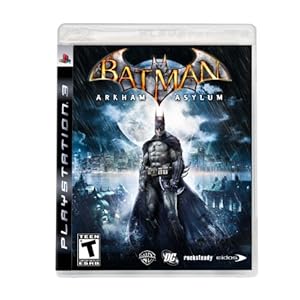
It's still a bit amazing how Rocksteady came out of nowhere and made one of the most complete single player games in a while with a superhero that almost everyone has to at least like, though I do think it's in that rare position of being a great game but maybe a bit overrated by the world at large at the same time. I mean, how can a game really be that good when the bosses suck so universally? Still, that's mostly a quibble when the unique combat and stealth are both so well executed.
4. Flower (PS3)
Despite all the huge budget, lavishly produced games I played in 2009, this small, two hour piece of art probably hit me the hardest of anything. I know not everyone is going to be affected by something the same way, but at least for me, it was an experience that was at different times relaxing, distressing, and profoundly moving. And probably my favorite use of sound in any game last year as well.
3. Call of Duty: Modern Warfare 2 (Multi)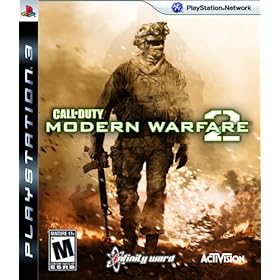
I didn't expect to be swept up again, but if nothing else, Infinity Ward is a group of professionals who know how to make a tight, engrossing single player experience, and can throw some good online play on top of it. I've had a chance to check out the two player Spec Ops missions as well, and they help extend the life of a game that's campaign can be finished in only 5 or 6 hours, but has plenty of moments worth revisiting and enough other content to keep shooter fans happy for a while.
2. Assassin's Creed II (Multi)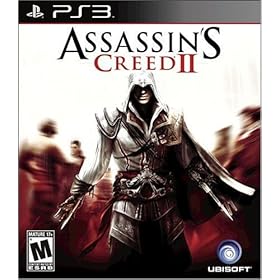
I already really, really liked the first game despite its faults in some areas, so a sequel that fixes pretty much all of those was a shoe-in to appear high on this list. With a much more varied and thoughtful progression through the game, improved storytelling, more incentive to explore, and movement and combat systems that stand out from the rest of the world's open world action adventures, it's an extremely rewarding and fun game that does everything a sequel should.
1. Uncharted 2: Among Thieves (PS3)
This is the king of good sequels though, and I suppose my favorite game of this generation of consoles. I have a bit of an "I liked Uncharted before it was cool" thing going on, but it's nice to see the second attempt take it from being an interesting, genre-spanning gamer's game to a genuinely successful and nigh-universally praised technological marvel. It's not flawless, but the single player campaign is a stunning, immensely fun, beautifully paced near-masterpiece and the online multiplayer ain't half bad either. Anybody who owns a PS3 or has easy access to one and hasn't given it a shot is only robbing themselves of something pretty special.
Thursday, December 3, 2009
Assassin's Creed II

A lot of people had issues with the first game, though I liked it quite a lot. Still, it had its flaws. Running around, climbing up buildings, and sticking dudes with your hidden blade was a lot of fun. But the amount of variety in the missions was extremely limited - none of the tasks were by themselves terribly boring, but when there's only a handful that repeat constantly, it can become a drag. This is where the sequel sees its biggest improvement - the main progression through the game is much more involved and story-based, with the more mundane tasks set aside as option side missions. The limit to what you can do hasn't expanded greatly - you're still stealthily taking out Templars, visiting various hard to reach locations, trailing people and eavesdropping to gather information. Some annoyances are still there, like the beggars being replaced with minstrels. You're just more invested in what you're doing because you believe in Ezio's personal cause more than you did in Altair's sense of duty.
And there are improvements to be seen everywhere. Your arsenal of weapons and acrobatic moves is expanded. There's more visual variety as missions can take place at different times of the day and events like festivals can change the atmosphere. There's a whole economy added now to buy items and improved equipment, although it's a little broken. The reward for almost everything you do is money, though once you've fully upgraded your home you basically never run out of it, limiting how useful more of it becomes. I didn't notice a big difference in the quality of the weapons, even between the best and the worst, and regardless of how much health/armor you have it didn't seem to have a big influence on how long you can stay alive. But you can pay for transit quickly between distant places, and there's a bunch of optional content that's some of the most interesting I've seen in a game. Tracking down seals in hidden tombs is an actual test of your platforming skill that eventually rewards you with some nice gear, and finding hidden glyphs on buildings throughout Italy unlocks interesting little puzzles that expand on the game's ridiculous yet entertaining story.
Not everything's better though. People complained about the first game constantly kicking you back into the real world where the series' true protagonist Desmond is being experimented on, but I thought it was an intriguing element to the story and enjoyed the drip-feed of new information, while there's only a couple of those sort of segments in this game. They're fairly revealing, but it made it easier to forget what the game's really about. The aforementioned glyphs helped, but I still missed it. And I thought the first game's setting was more interesting than Renaissance Italy. The game does interesting stuff with art and history there, but I enjoyed the aesthetic less, and things like Venice's canals made it harder to get around. Also, one thing that's not much improved is the combat. The new variety of weapons is cool, but it's still a lot of waiting for the opportunity to counter your enemy's attacks, with some of the complexity and danger actually taken out - you never have to worry about getting grabbed, and it seems overall a lot easier to bolt and avoid danger altogether. And the facial animation actually seems way worse - especially on Kristen Bell's character. The game's environments look nice, but not so much the conversations.
The story is worth mentioning, mostly because it's totally insane. You get a taste of the vast, millennia-long secret war between Assassins and Templars in the first game, but the sequel really dives into the crazy conspiracy aspect of it, and it's almost too over-the-top. As you can tell from the hidden messages in the glyphs, there's hardly a significant event in the last two thousand years of history that these groups and the "pieces of Eden" they found haven't had a hand in, and the number of famous people involved is astounding. I totally enjoyed this aspect of the plot - if you're gonna imply something this big, go ahead and go crazy with it. It's all dwarfed by the ending though, which reveals more about the conflict's origins than anyone could possibly comprehend. It's - it's just nuts. And it's all wrapped in Ezio's story, which is pretty solid on its own in places. If I was looking forward to what happened next after the first game, I'm positively foaming over it now. Creed II is one of the most fun open-world games I've ever played, and I'm extremely curious when and where the next one will take place.
Monday, January 14, 2008
Best Games of 2007
It was a banner year for video games, and I didn't even get to play some of the biggest ones, like Halo 3, Mass Effect, and Super Mario Galaxy. I liked The Darkness, but it doesn't quite stand up with the year's other great shooters, and had fun with Ninja Gaiden Sigma, but haven't got around to finishing it since I don't find challenge for its own sake particularly compelling. Sam and Max's first season of episodic adventures was also a pretty good time. I decided to only list a game as multi-platform if I played it on console and it's available on more than one. Don't ask me why. Luckily, that's consistent with last year's list.
Best of 2007
7. Assassin's Creed (Multi)
It got a lot of flack for not reaching its potential, but its potential was so absurdly high that I can't fault it that much for it. I expect a lot more from the obvious sequel, but I thought Assassin's Creed was a great start for a potentially tremendous series, with excellent core mechanics, a wonderful feel, and a very intriguing storyline, even if the normal missions were as repetitive as hell. It seems a little rushed and empty at times, but I still had quite a good time running through the cities and eviscerating unwitting guards like a parkour ninja.
6. Uncharted: Drake's Fortune (PS3)
Another first installment of a series with a possibly great future. It dips its toe in the pool of frustration once in a while, but never dives in like the Jak franchise did. It doesn't particularly excel in any one area, but it's a good jack-of-all-trades kind of game; fun shooting, fun traversal (although it can't match Creed's smoothness), great graphics and sound, excellently presented and fairly interesting storyline. If they can just add some depth to the puzzle elements and keep the environments fresh, Uncharted 2 should be fantastic.
5. God of War II (PS2)
Perhaps the last great game of its generation, God of War II helped it go out with a bang. Based on the fact that the PS2 is still selling, we're going to be seeing things like Persona 3 and enjoyable ports once in a while, but I still see this as the last stand. It looks pretty terrific for a PS2 game, hitting you right in the beginning with the absurdly epic battle against the Colossus of Rhodes. It gets bigger from there, as they keep what was great about the first game, mixing easy-to-use but entertaining combat with functional puzzles and platforming, while evening out the pacing a bit to keep it fun throughout. Of course, they set up the sequel at the end, leaving fans to wonder how incredible the next game will be on PS3.
4. Call of Duty 4: Modern Warfare (Multi)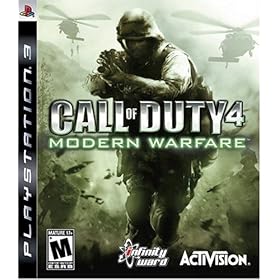
I don't have as much perspective on this as the other games since it was the last thing I finished, but I can still see it was a step forward for first-person shooters, maybe not reinventing the wheel but making it a damn smooth ride. I played the first couple games on PC, but as the series has transitioned to be more console focused, it's still just as gripping and entertaining. Probably the best pure shooting-things game of the year.
3. Ratchet and Clank Future: Tools of Destruction (PS3)
This is a pretty personal choice, as Tools of Destruction didn't do much to push gaming forward, it's merely another great entry in one of my favorite series. It had been some time since the last true game was released, but I settled right into the Ratchet groove as soon as the game started, running around, blowing up everything in sight, enjoying the various diversions, collecting experience, and just having a fun time. The ending left you hanging, but you don't mind too much when you can jump into challenge mode and keep going after all the hidden extras.
2. Bioshock (360)
The best game story of the year, and not just because of the content, but because of how well they use the medium itself to tell it, defying expectations and keeping you immersed in a pretty incredibly designed experience. Big Daddies are still awesome, mixing tonics and plasmids is still good experimental fun, and the encounter with Andrew Ryan is still one of gaming's best moments ever. The gameplay is still stuck somewhere between real shooting and a rich first person RPG experience, but gameplay was the least important aspect as far as I was concerned.
1. The Orange Box (PC)
I wasn't sure at first whether to count this, as it sort of seems like cheating. I didn't review it as a single package. After all, it's not one game, it's five, two of which I've already played before. But even without the old content, I still got more fun out of it than anything else this year. Episode Two is an excellent continuation of my favorite FPS series, Portal is a brilliant, hilarious, brain-twisting experience, and Team Fortress 2 is the most fun I've had playing online since Battlefield 2. It's kind of a cop out, but The Orange Box is the best gaming value you can get for normal retail price this year.
Thursday, December 13, 2007
Assassin's Creed

A spiritual sequel to the Prince of Persia games of the last generation of consoles, Creed has a familiar feel but replaces the linearity with an open world, wall running and time control powers with an awesome free-running system, the fantasy setting with a science fiction one, and the mediocre combat with slightly different mediocre combat. Many have complained about the repetitive mission structure, and they're justified in doing so. There are only about half a dozen types of activities you can do than make up the bulk of the game, leaving the actual assassinating a little too infrequent. But it's not that big of a deal. I wish they could have fleshed out the whole investigating idea, and made it feel more like you were planning a highly delicate operation instead of just repeating some simple tasks before getting to go after your target, but I can't blame them too much when it's so fun just to play around in the world. If you don't like picking pockets and doing all the other assassin's chores, you only have to do some of it. If something's frustrating, you usually can ignore it and still move on with the game. Personally, I did every investigation, rescued every citizen, and climbed every vantage point. The game rewards you for doing so, giving you tips and maps that make the job a little easier and extra means to escape pursuers. I didn't collect all the flags though, because that would be tiresome and completely pointless, as all they unlock is achievements in the 360 version.
Other problems people have is with the AI and combat that's all too easy once you learn the counter-kill. I agree that it's pretty ridiculous that you can get away with killing guards right in front of each other if you just pose like a monk while doing it, but once they do start chasing you, I was pretty impressed with how they kept up. Getting away from guards is about as fun a chase as there is in video games. Altair can climb and jump and do anything a human could conceivably do, and it's a unique sort of fun to use your awesome yet believable abilities to evade soldiers who can chase you almost anywhere. It is pretty lame how enemies only attack one at a time, but while it's too easy, I did have fun toying with enemies before dispatching them in a number of satisfying ways. The open space between cities was also a bit of fun to ride around in on a horse, and definitely gave off a Shadow of the Colossus vibe with the look of the environment. It's not really a spoiler to say that this game doesn't take place during the crusades, since it's revealed you're in a simulation during the near future right at the beginning. There are two plot threads, the crusade one which wraps up by game's end, and the future one that does a good job of stringing you along with little bits of information before leaving you hanging for the obvious sequel. It will be interesting to see where they go with that, I imagine it will take place at a different point in history, with perhaps the third game finally being all in the modern day. The voice acting is a bit repetitive, but otherwise the game sounds good, and looks good too. The look is very nice, and technically the world is very impressive, except for some pop up when outdoors and an inconsistent frame rate. What's odd is that it doesn't slow down, but speed up in a couple unique situations. It's not a big deal, just strange. Assassin's Creed isn't the completely amazing game it looked like it could have been from the trailers, but they definitely built a very promising foundation for the future.

































